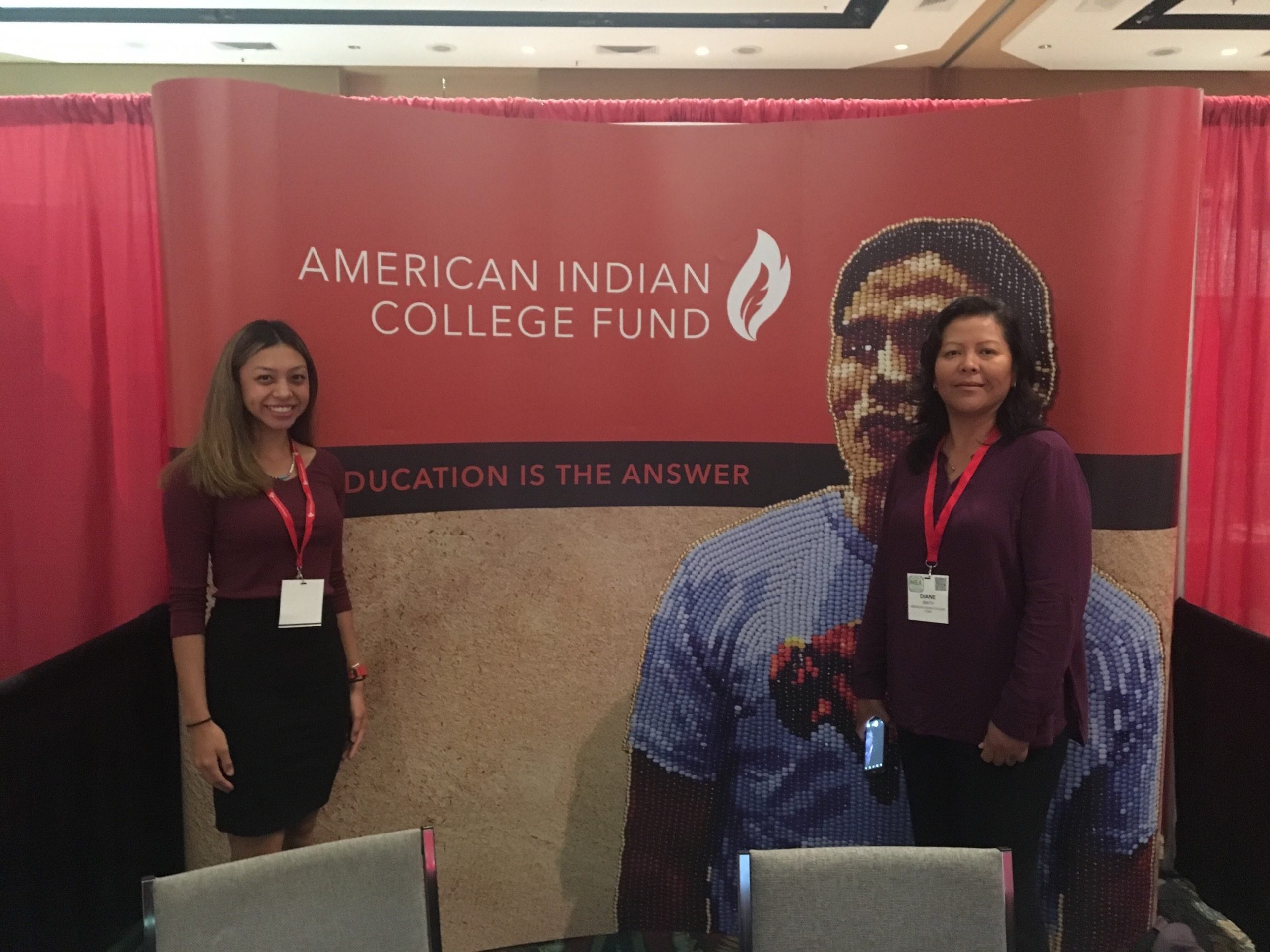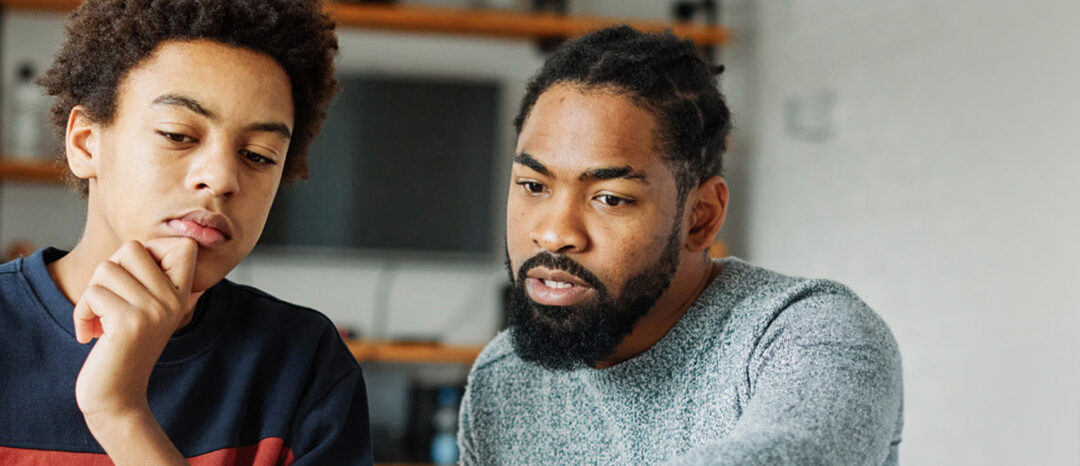Walmart knows that providing outstanding students with scholarships is just one of the stepping stones students need to succeed. Opportunities to network outside of campus and community are important in exposing students to new ideas and possibilities as part of a students’ intellectual development—and career path. To that end, Walmart provides student scholars with the opportunity to attend a professional conference of their choice. The American Indian College Fund is highlighting Walmart scholars and their experiences to show how these opportunities help our students grow and expand their opportunities.

Kami (left) and Diane pose for a photo at the National Indian Education Association in 2018.
Diane: Working for Education, Tradition, and Culture of Native People
Diane (Diné), a first-year student at Navajo Technical University, assumed she was one of the few people who valued incorporating Native culture into education. But thanks to the opportunity to attend the National Indian Education Association conference as a Walmart scholar, Diane discovered a community of educators who do just that.
The conference introduced Diane to Native women from across the country who are striving to “teach their tribal cultures from youth to adults, and the central understanding is never forgotten ancestors and the value of continuing education to improve community harmony, self-awareness, and develop our education system within.”
As a result, Diane is now examining her career and life goals.
“I cannot honestly say I never had any intention of teaching or encouraging the pursuit of higher education nor I was I against it, but it never occurred to me how to promote or point an enthusiastic individual in the right direction. This conference exposed me to vast ways people inspire others just through their teaching, and how they show younger students that others have faced what they are experiencing so they so do not feel alone,” Diane says.
After attending the NIEA conference Diane has found that she is not only interested in guiding young people in advancing their schooling, but also in advocating for her local tribal university.
The combined sessions exposed Diane to teaching techniques, learning through listening, and gave multiple examples of how to inspire and educate young people. She also learned about Native American study groups at numerous universities from every corner of the country.
In addition to discovering new teaching and learning tools, Diane also says the networking was invaluable. “I am more knowledgeable where to look how to apply and even contact people through the networking at this conference. I am incredibly grateful for this opportunity, the enlightenment showing me how to be a resource, positive influence, and mentor to young Natives.”
Diane also picked up information about U.S. government funding policy with regard to Indian reservations, and persistent inequities in funding when comparing American Indians and other ethnic and racial groups, and questioning and shedding light on the imbalance of government funding. “A continuing fight for equal expenditures will be required for all Native American tribes in the United States,” Diane says, noting that she is now willing to work for education of young people and help maintain their tribal culture.
The conference also gave Diane perspective. She cited a speaker in the general session, who spoke candidly about her adventures in earning her Ph.D. in education. “She felt alienated in a mainstream university; she noted limited Native American students, lack of representation, and loneliness. Yet she is an advocate for tribes creating and continuing accredited colleges and universities,” Diane says. “Life gives a bag of stones; it is our responsibility to create diamonds by reverting to traditional teachings and spirituality.”
Kami: Walmart Scholar and Future Lawyer Learns About the Fundamentals of Good Policymaking
Kami (Muscogee Creek Nation), a second-year American Indian Studies major at Haskell Indian Nations University, has set her goal to continue her education at law school. Kami attended the National Indian Education Association (NIEA) conference. “I was able to learn a lot about the past of Native Americans to better understand our needs in the 21st century. Attending the NIEA was eye-opening because there is a lot of underrepresentation within Indian Country concerning health, policy, litigation, and the misusage of resources to have a powerful and legitimate government.”
Understanding where the gaps are between the needs in Native communities and filling them will help Kami better serve Native communities as a lawyer, whether she chooses to work as a litigator or policy-maker.
Kami learned it is not enough to identify how to meet a need, however. She also learned about the importance of identifying and addressing the social impact that goes hand-in-hand with need and years of traumatic encounters with non-Natives.
“Throughout the workshops there were two important sessions that have acted as a stepping stone in my academic and career goals: Impacts of Residential School and Colonization with Brad Marsden, where I learned about the history of Native people in boarding schools and the behavior that followed after people experienced traumatic encounters; and 100 Years: One Woman’s Fight for Justice with Melinda Janko, where participants were taken on the journey of the largest class action lawsuit against the government over mismanaged land.
Attending both seminars provided me with the motivation to seek better policies amongst 638 contracting within Indian Health Services because…we need to take in consideration of the past in order to make a difference for the future. Health amongst Native Americans is deteriorating both mentally and physically, and many tribal members can no longer practice traditions and ceremonies or even daily routines.
Being able to talk with Mr. Marsden and Ms. Janko about my passions opened the door to other networking opportunities in the [conference] exhibit hall. Being able to network with different law schools and organization representatives was helpful. I was able to connect with Nicholas Courtney at George Washington University, where I have applied for an internship to gain insight in the political relationship between Native Americans and the federal government.”
Kami says the NIEA conference left her contemplating the quote, “Every time an elder dies, our tradition goes with them.”
“With Native Americans only making up a small portion of the world population, I know we have to work harder to know our traditional background to pass onto future generations. However, limited resources and policies have inhibited us to pursue great things within our communities,” Kami says.
Thanks to the NIEA conference, Kami now sees the interconnected ways she can create more effective governmental policies that lead to greater resources and systemic change in Indian Country.








